B2B CRM Guide (Trends, Strategies & Software Reviews)
Get system-wide visibility into your sales ecosystem and detailed insight into your customers’ journey with B2B CRM.
更新日: August 22, 2025
A guide to choosing the best CRM system for B2B
Customer relationship management (CRM) software is a powerful technology that allows companies to stay organized and boost sales. Providing an easily accessible database of customer information and a large selection of useful business tools, CRM adoption often leads to a remarkable increase in productivity and growth.
B2B companies in particular can reap incredible benefits from a CRM system. But with a plethora of options, choosing the right CRM—especially one that is B2B—friendly-can be a daunting task.
In this guide, we’ll simplify that task by answering the following questions about the functions and benefits of a B2B CRM software platform. We'll also highlight 15 top B2B CRM software options on the market today.
- What is a B2B CRM?
- What are its benefits?
- B2B CRM Trends
- B2B CRM Best practices
- B2B CRM Strategies
- Top B2B CRM software platforms
- How to choose the right CRM for your B2B company
- Frequently asked questions
- Ready to boost your sales?
What is a B2B CRM?
A B2B CRM is a customer relationship management platform that caters specifically to businesses that sell to other businesses (business-to-business, or B2B sales) instead of customers in the general public (business-to-customer, or B2C).
At the heart of a simple CRM is a central dashboard that sales reps can use to easily locate and share customer and sales information. A CRM always includes contact management software—a complete, digitized address book that organizes the contact information of every lead and customer.
A B2B-friendly CRM will also allow businesses to view cutting-edge reporting, analytics, and forecasting tools. Lastly, a CRM offers numerous sales and marketing automations. A B2B company using a modern sales CRM saves their reps valuable time and ultimately speeds up the sales process.
What is the purpose of a B2B CRM system?
The number one purpose of a B2B CRM system is to boost sales. Without CRM technology, reps are forced to spend time switching between tabs, manually nurturing leads, looking through spreadsheets, and doing repetitive (and error-prone) tasks like data entry.
This time could be better spent forming the complex and lasting customer relationships that are the backbone of any B2B company. Put B2B CRM technology to work, and watch sales increase.
What are the benefits of using B2B CRM software?
The benefits of B2B CRM software are felt company-wide. The software can improve processes in the sales, marketing, and customer service realms. CRM software allows B2B companies to:
- Stay organized anywhere: Top CRM software is cloud-based. With a cloud CRM, reps can view contact information and documents anywhere, even without internet access. Many platforms also offer a mobile app. With mobile CRM, reps can take all the information they need on the go.
- Strengthen communication: A CRM database operates from a centralized hub containing all the information reps need to do their jobs. When a rep pulls up a customer profile, they can see all contact information, notes, and summaries of previous interactions. This allows for organized communication, with a noticeably personal touch. Often, CRM platforms can also source and fill in any missing contact information for customers.
- Gain powerful customer insights and identify areas for growth: Great CRM platforms offer analytics and reporting tools to help companies pinpoint areas for improvement and reach their goals. CRMs gather data related to marketing campaigns, sales performance, and customer service quality. CRM reports turn this data into visual representations that are easy for users to understand. Companies can use these reports to make informed decisions when it comes to future spending, and locate areas in their processes in need of refining.
- Increase sales: All the tools of CRM combine to bring businesses the ultimate benefit-more sales and more profit. Marketing and sales automations cut back on the need for reps to perform repetitive administrative tasks like data entry, scheduling, and bulk emails. Letting the software take care of these tasks leaves reps with more time to devote to sales.
B2B CRM trends
CRM software is always expanding to fit changing business needs. Here are a couple top trends in the B2B CRM industry today:
Inside sales are here to stay. Inside sales, the practice of selling to customers remotely, rather than in person, has become increasingly popular due to the pandemic. B2B CRM platforms have been investing in tools like self-service portals, cloud-based technology, and AI chatbots to make selling online simple.
The market for predictive analytics is growing. Predictive analytics use data to forecast revenue and future business trends. Companies can use predictive analytics to make informed decisions about spending and marketing endeavors. They can also see how on track they are to meet goals. The predictive analytics market is projected to grow from 10.5 billion to 28.1 billion by 2026.
B2B CRM best practices
There are countless ways to ensure your CRM works for you. Here are a few best practices for taking full advantage of your B2B CRM:
- Utilize CRM automations. Automations ensure your business reaches customers before the competition does. This is especially important for B2B companies, who have a smaller pool of leads to nudge. With CRM software, businesses can set automations to send immediate personalized emails to website visitors who indicate interest by sharing their information.
- Use your data. Don’t just look at the CRM reports you receive: use them to improve. Data can be used to shorten your sales pipeline and improve customer service. This means happier customers and more sales.
- Create targeted advertising campaigns. CRM platforms help businesses advertise smarter. They can report the success rates of ads and messaging on a small scale, before a company launches a campaign. Don’t waste money on unsuccessful advertising-put CRM analytics and reporting tools to work.
B2B CRM strategies
There are several strategies companies use for building a watertight B2B sales funnel with their CRM software. Here are a few of the most effective:
- Attract attention from leads. You can use your CRM’s existing customer base to identify characteristics of promising leads. Tap into your CRM’s reporting tools to identify common pain points for your current customers, and use this information to attract new leads.
- Nurture relationships. Be there whenever a customer needs information from you. Use automation tools to send immediate, personalized follow-ups when a lead expresses interest. Employ AI chatbots to make sure information is available 24/7.
- Create long term relationships with customers. B2B companies often rely more heavily on income from upselling, cross selling, and renewals than B2C companies. Knowing this, it’s vital for B2B companies to cultivate and maintain strong relationships with happy customers. CRM ensures you always have an eye on the customer relationship, and can time strategized communication. Plus, those happy customers are far more likely to recommend you to their colleagues.
What role does CRM play in B2B lead generation?
B2B companies face a greater challenge when it comes to lead generation than B2C companies; they simply have a smaller pool of leads to source. The best CRM platforms include lead generation tools that can capture leads in a number of ways.
Many platforms can turn website visitors into leads. Pop-up AI chatbots on the homepage of a company website can provide helpful information to interested parties, and generate leads by collecting contact information from those who provide it.
Leads can also be sourced through CRM marketing automations. Forms embedded in video advertisements and social media posts make it easy for leads to enter their contact information in real time.
CRM can also generate B2B leads through social media sites like Linkedin. With the right integrations, it’s simple to target professionals by desired industry or company.
Finally, referrals are a great way for B2B companies to gather leads. CRM customer service tools do the work to make sure customers are satisfied and excited to send their colleagues your way.
What is the difference between a B2B CRM system and a B2C CRM system?
B2B companies have a smaller pool of leads to pull from than their B2C counterparts. And because these businesses are working with entire companies, rather than the general public, the sales cycle is often significantly longer.
B2C companies generally need to win the approval of one potential customer, whereas B2B must gain buy-in from several decision makers. CRMs that cater to B2B companies address these challenges, and help B2B companies keep their process organized, personalized, and on schedule.
What role does a B2B CRM system play in a sales and marketing plan?
B2B CRMs have the technology to refine and optimize a company’s sales and marketing plans. With a smaller pool of leads, it becomes exponentially more important to get marketing and sales processes right.
Without data, companies have to rely on pure guesswork; not only is this outdated, it wastes time and money. Analytics can help companies quickly identify areas for improvement within their sales and marketing tactics. CRM software works to help companies accurately refine their messaging and sales processes in a way that sparks results.
What are the top B2B CRM software?
Salesforce

Salesforce is a CRM platform that manages relationships with customers, leads, and business partners. The platform offers different packages depending on the size of the businesses. Salesforce includes a B2B commerce feature that allows self-service purchases business-to-business.
Teams can access a shared profile of each contact through a database. The software tracks information about each incoming lead, and uses this data to qualify the lead. Leads are then routed to appropriate sales reps.
Features:
- Activity dashboard
- Calendar/reminder system
- Lead capture
- Social media integration
- Marketing automations
Close

Close is a sales engagement CRM platform built specifically for small businesses. The platform is built around the sales rep, and gives the entire team access to everything happening in the sales cycle.
Reps can view a dashboard of their sales activities and receive reminders for upcoming tasks and communications. They can also automatically send follow-up personalized emails. Close’s predictive dialer feature can dial multiple numbers at once, and then route those who answer to an available rep.
Features:
- Dashboard
- Data import/export
- Email monitoring
- Performance metrics
- Task management
Zoho CRM
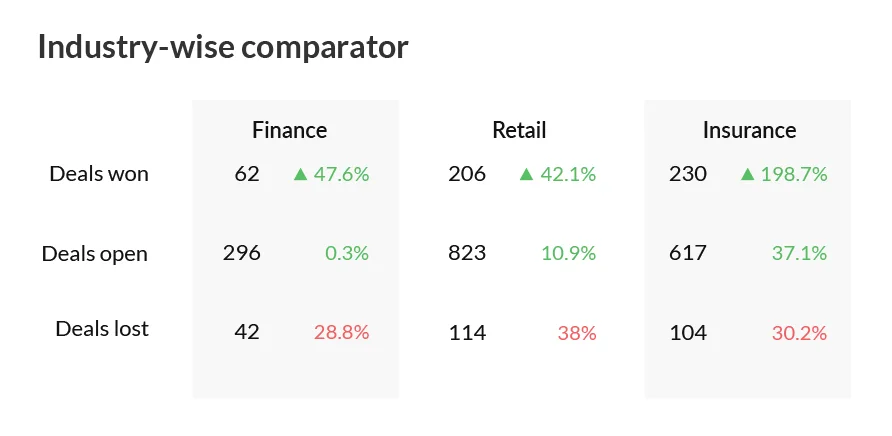
Zoho CRM is a customer relationship management platform that services small and enterprise businesses. The platform features a central Omnichannel through which reps can reach contacts by phone, email, or social media.
Zoho includes salesforce automation software that automatically schedules sales meetings, sends followup communications, and updates sales opportunities. The software also includes analytics and a customizable visual pipeline. Users may create reports from templates and share with other team members.
Features:
- Analytics/ROI tracking
- Campaign management
- Lead management
- Sales forecasting
- Marketing automation
Nutshell

Nutshell is a CRM and email marketing platform made specifically for B2B sales. The platform features a contact database and sales and marketing tools in a central location.
Nutshell offers a visual customizable pipeline tool, and collects data as customers move through their lifecycle. The platform also features collaboration tools, analytics, and marketing automations. Users can access shared customer information, and share reports among teams.
Features:
- Customer database
- Lead distribution
- Pipeline management
- Email marketing
- Performance metrics
Hubspot
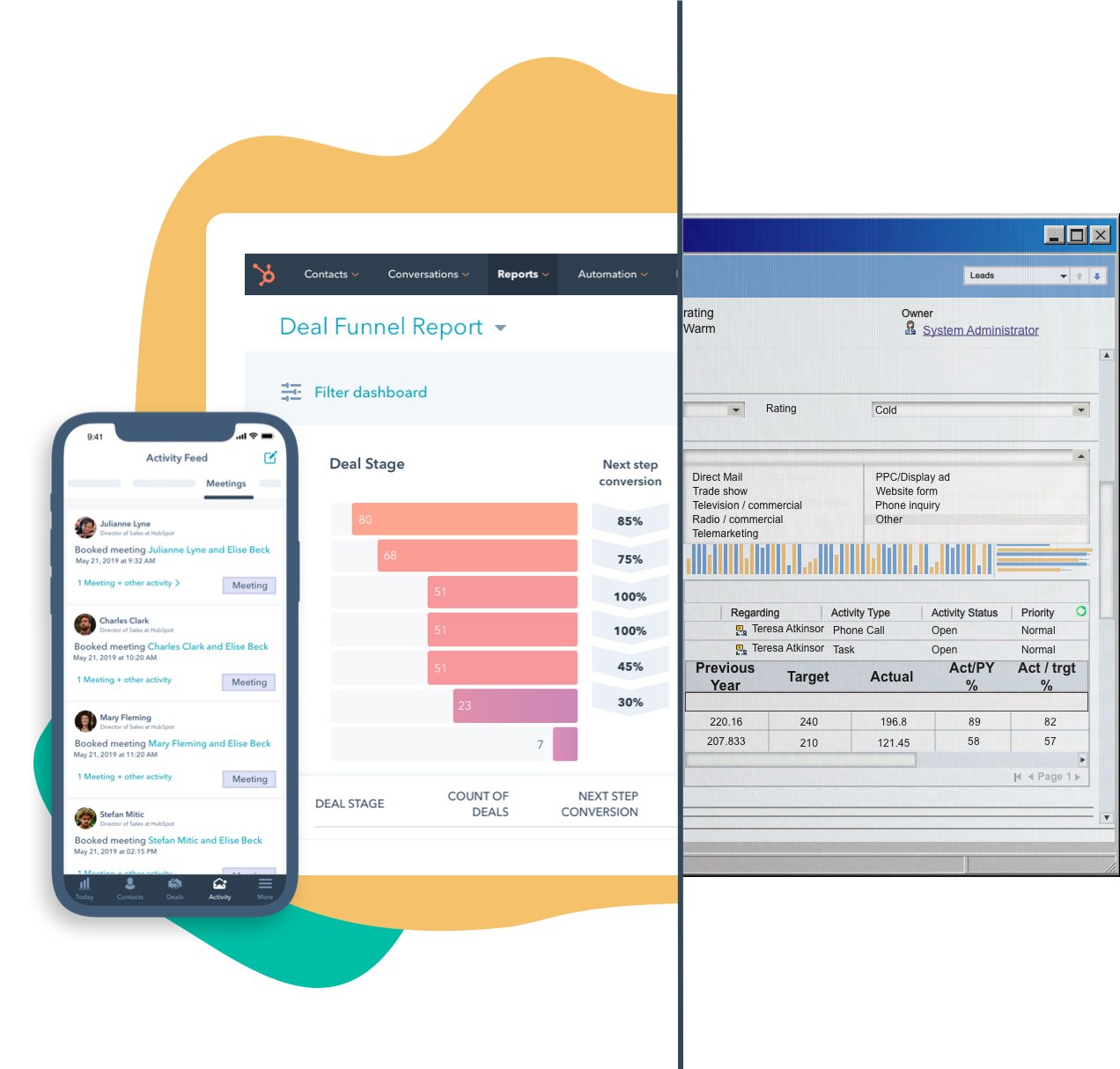
Hubspot is a CRM platform that offers five “hubs” of varying business tools in the areas of marketing, sales, service, content management, and operations. Hubspot offers different packages for small, medium, and enterprise businesses.
Tools in the marketing hub capture and qualify B2B leads through blogs, website visits, ads, and social media. The sales hub features sales engagement tools and reporting/analytics. The service hub offers help desk automations, and compiles data from customer feedback surveys.
Features:
- Activity dashboard
- Lead capture
- Client tracking
- Marketing automation
- Social media integration
Pipeliner

Pipeliner is a CRM platform that offers packages for startups, small businesses, and enterprise businesses. The software keeps a directory of contacts and offers integrations with Outlook and Gmail. Reps can email directly from the platform without switching tabs. Contacts stored within Google and Microsoft suites can be imported directly into the Pipeliner system.
Pipeliner’s sales AI engine, named Voyager, collects data related to the sales process and creates reports for reps and their managers. The platform also offers a mobile app.
Features:
- Lead generation
- Mobile access
- Task management
- Marketing automation
- Social media integration
Salesflare

With Salesflare, reps can search for contacts within a database using their first or last name, company name, or contact details. Salesflare is a CRM and sales engagement platform designed for small and medium sized B2B companies.
The platform logs all interactions automatically, and imports upcoming meetings and tasks into a calendar. It also notifies reps when it is time to take the next step with a customer. The software keeps a folder of documents for each customer, which can be shared internally.
Features:
- Contact management
- Interaction tracking
- Dynamic content
- Opportunity management
- Reporting/analytics
Insightly
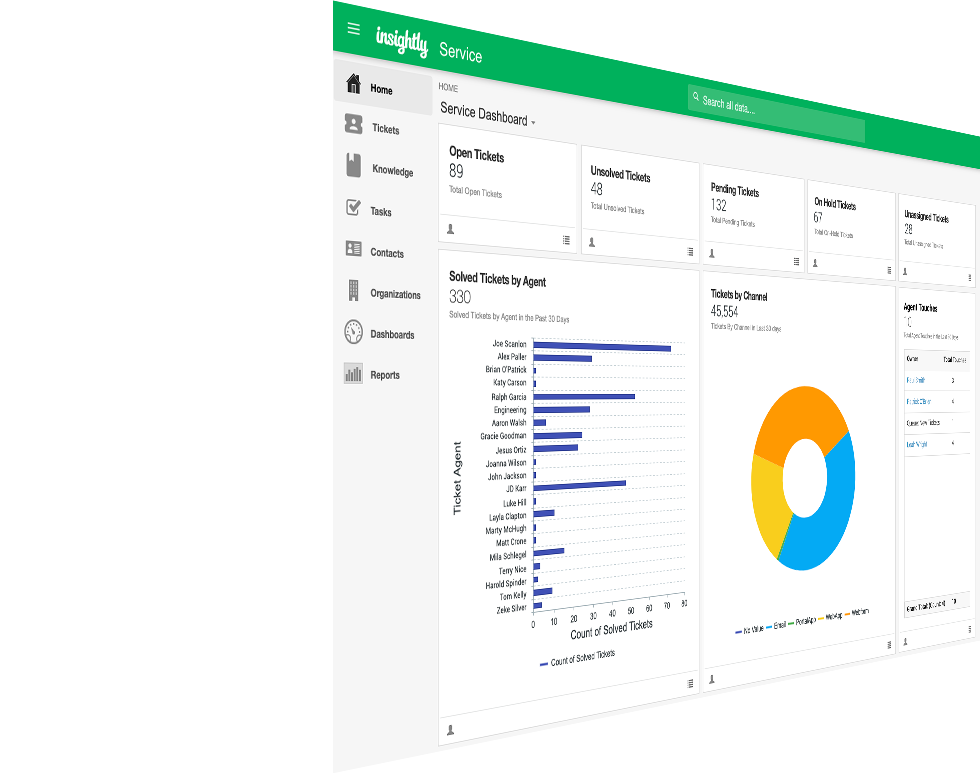
Insightly is a CRM platform for small, midsize, or enterprise businesses. The platform features native integrations to Gmail, Office 365, MailChimp, and other common business tools.
Insightly offers workflow automations including email alerts, creating or updating records, and generating tasks for others when opportunities arise. The platform automatically qualifies and routes leads to the appropriate sales rep. Users may also send emails within the platform and track when and if the emails are opened by recipients.
Features:
- Calendar/reminder system
- Email marketing
- Lead generation
- Marketing automation
- Mobile access
NetSuite
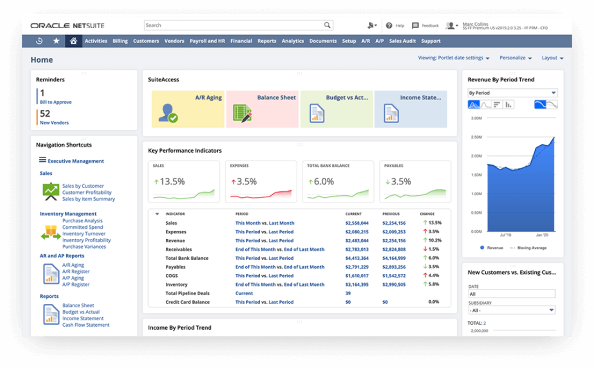
NetSuite software manages partner relationships, quotes, commissions, and other business interactions for small to midsize companies. The platform allows for information sharing between business partners and can manage joint marketing campaigns as well.
NetSuite collects data throughout the customer lifecycle and notifies reps when opportunities for upselling and cross-selling emerge. Marketing automation tools measure a lead’s activity and identify when a prospect is buyer-ready. NetSuite can also forecast future sales and trends.
Features:
- Activity dashboard
- Document management
- Lead capture
- Commission management
- Reporting/analytics
Nimble

Nimble is a CRM platform that can be used by businesses of any size. Nimble combines contacts from Office 365, G Suite, and social media into one database, while searching social media to fill out any missing contact information.
Reps can open the platform to access calendar appointments, customer insights, and a visual sales pipeline from a central dashboard. Nimble’s Smart Agenda feature lets reps manage upcoming tasks and delegate tasks to other team members.
Features:
- Shared contacts
- Prospecting tools
- Sales forecasting
- Sales pipeline management
- Predictive analytics
Pipedrive
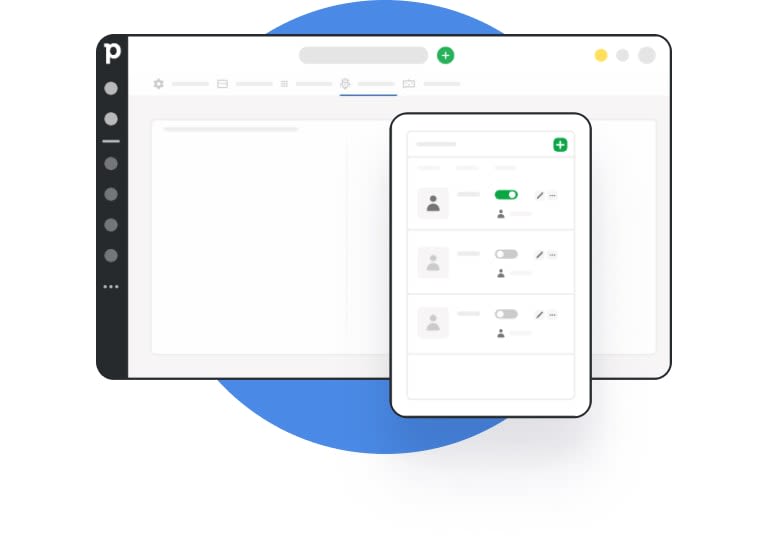
Pipedrive is a lead management platform for small, midsize, and enterprise businesses. Users of Pipedrive create a visual pipeline tool and can watch customers move through each stage of closing a deal. The software collects data as customers move through their lifecycle and creates reports. Businesses can then use these reports to modify steps or reroute customers.
The platform also offers a lead generation chatbot, which website visitors can choose to give information to. Leads are then qualified and distributed.
Features:
- Client tracking
- Email management
- Opportunity management
- Statistical analysis
- Survey/poll management
ActiveCampaign
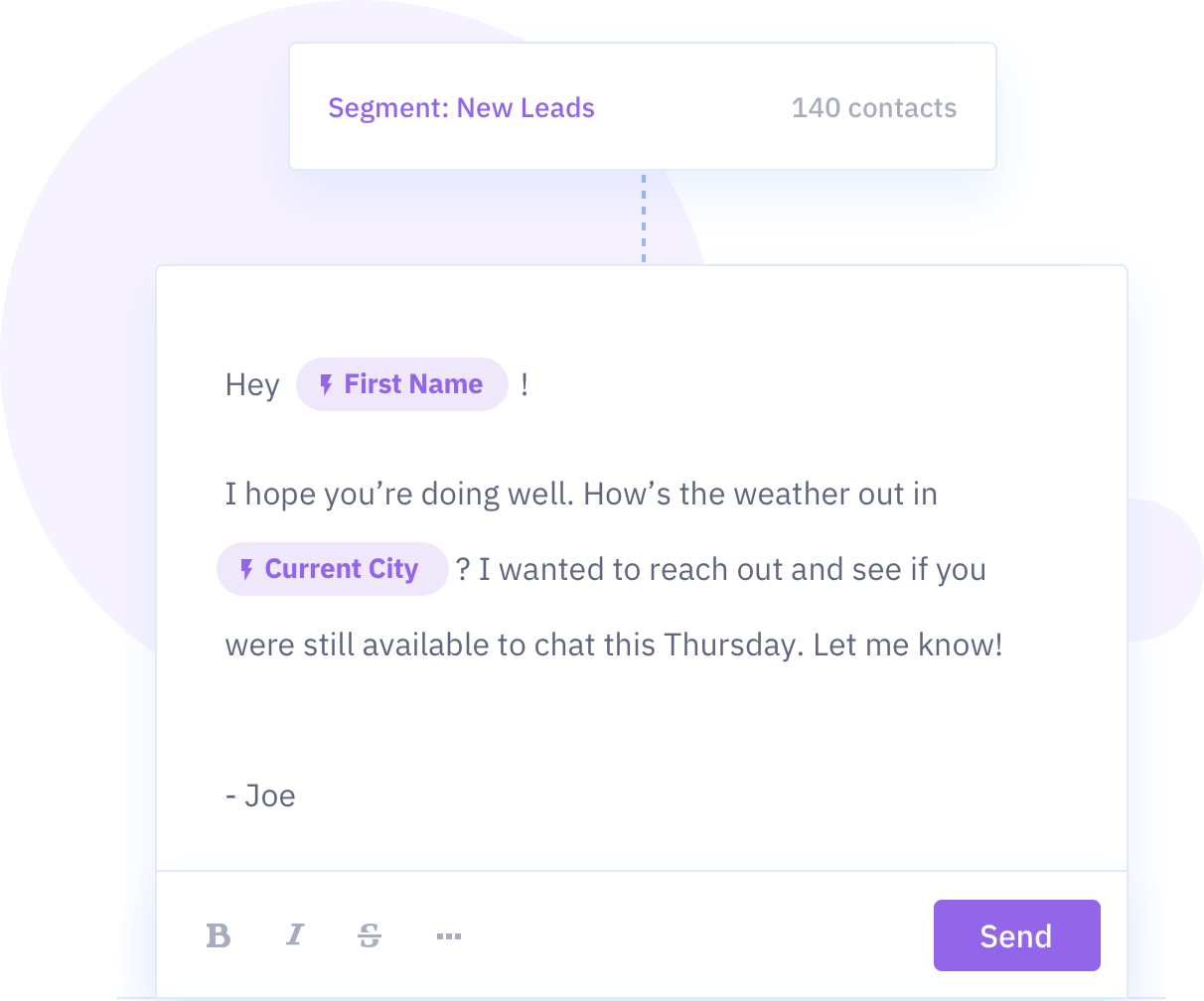
ActiveCampaign is a CRM and email marketing software that offers a specific package for B2B organizations. Users can access different communication channels, including text, calling, and emails, in one place.
ActiveCampaign is built for any size of business, and features customer experience automations. This means the platform keeps an eye on each customer’s journey, and notifies reps to take action at the optimum time in the buying cycle. Marketing automations perform personalized outreach for each lead.
Features:
- Analytics/ROI tracking
- Campaign planning
- Event triggered actions
- Email marketing
- Social media integration
Freshworks

Freshworks is a CRM and sales force automation platform that incorporates AI technology. The software imports all contacts into a central database, and tracks all communications with each contact.
The platform manages deals for any size business, and reps can trigger automatic follow ups when customers take certain actions. Freshworks’ AI technology, named Freddy, interacts with website visitors and generates leads when visitors choose to enter their information. Freddy also qualifies and distributes leads and collects data throughout the sales process.
Features:
- Alerts/notifications
- Collaboration tools
- Lead capture
- Internal chat integration
- Sales forecasting
Less Annoying CRM
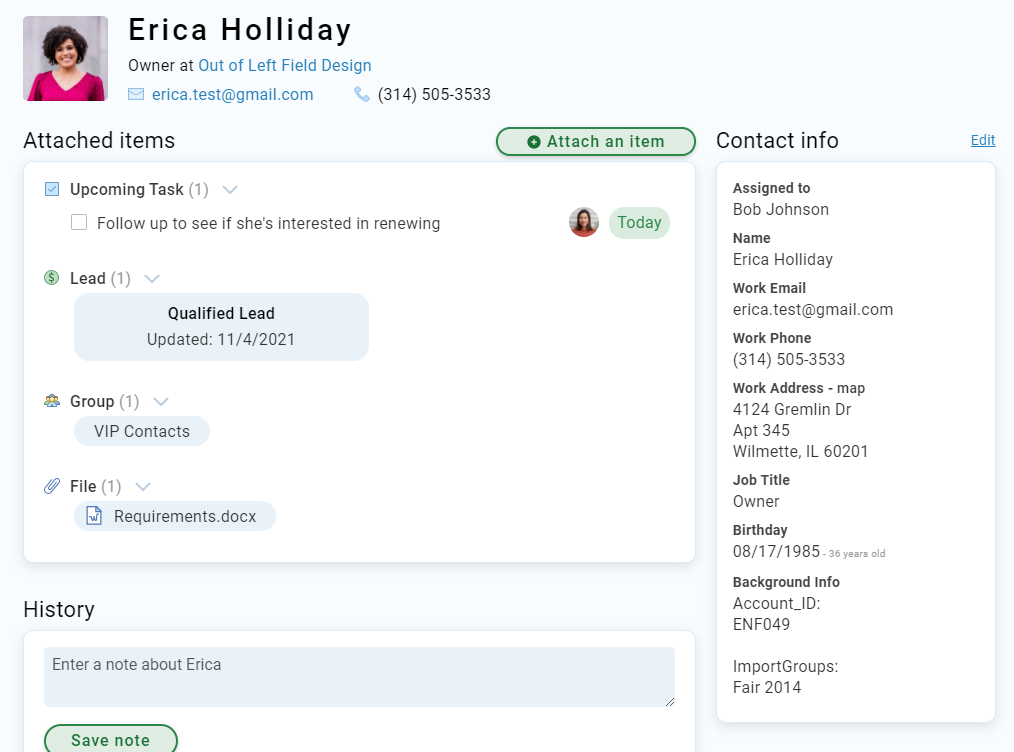
Less Annoying CRM is a customer relationship management software for small businesses. Built specifically to service small teams, the software offers collaboration tools, and allows all team members to access shared information and reports.
Users of Less Annoying CRM can access a shared team calendar, and may sync events through an integration with Google calendar. Reps receive a continual lead report, which puts higher priority leads at the top. The report notes the last time there was communication between the business and the contact.
Features:
- Contact database
- Marketing automation
- Mobile access
- Lead distribution
- Interaction tracking
How to choose the right CRM for your B2B company?
With so many options out there, finding the best B2B CRM for your company will likely involve some in-depth research. As you research, keep the following tips in mind:
Make a list of your business goals. As you’re researching CRMs, make sure the software includes tools that will help you reach those goals.
Make sure the software is B2B friendly. The software you choose should cater to the challenges of B2B sales. The right CRM will collect data throughout the substantial B2B sales funnel, and allow for plenty of customization.
Keep size in mind. Some CRM platforms are built solely for businesses of a specific size, while others offer different packages for smaller or larger businesses. Research packages, and make sure they include all the tools you need.
Allow room for growth. If you’re looking to grow your business, make sure to choose a platform that can scale with you.
Frequently asked questions
Ready to boost your B2B customer experience?
IDriving growth in B2B isn’t only about closing deals—it’s about building strong, lasting relationships. To do that, you need more than a CRM. You need a platform that helps you deliver fast, personalized support at every stage of the customer journey.
Zendesk makes it simple. Our AI-powered, omnichannel solution was built for ease of use and quick implementation, so your teams can focus less on navigating tools and more on delivering value to customers. From streamlining service workflows to automating repetitive tasks, Zendesk gives you everything you need to scale without adding complexity.
Still on the fence? Try Zendesk free for 14 days and see how cutting-edge technology helps B2B companies strengthen relationships and keep customers for the long term.
